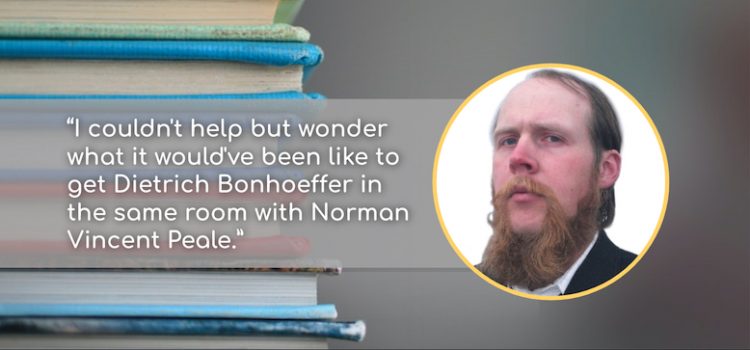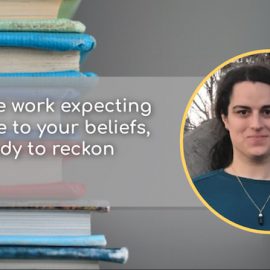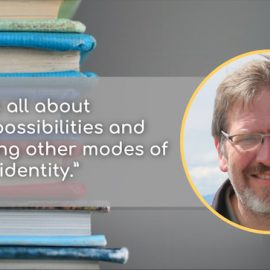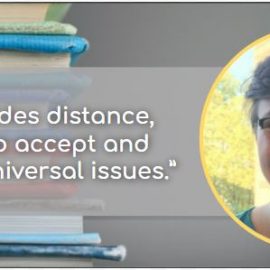
What author might have discovered the “holy grail of physics”? What books are fun bedtime reading for the whole family?
Timothy could tell you. Based in Idaho, he’s a book guide writer at Shortform. We interviewed him recently to learn a bit about his relationship with books, and he has some fascinating recommendations ranging from the classic to the obscure.
Our Interview With Timothy
Timothy has read a lot of books. He’s even authored a few. Armed with broad knowledge and level-headed analysis, he shares his reading insights and experiences with us.
What kind of work do you do at Shortform?
I’m a writer. I write book guides or revise our older summaries to bring them up to our current standards for book guides.
What’s your favorite book and why?
It’s hard to pick an overall favorite because I read different books for different reasons, so let me rephrase the question in a couple of different ways that I can more easily answer precisely.
If I had to spend the rest of my life on a desert island with only one book to read, what would it be? The Bible. I believe the Bible is the most meaningful book ever written, and it contains so many layers of meaning that you could spend a lifetime studying and rereading it without it ever getting old or running out of new insights.
What’s the most entertaining book I’ve ever read? That would be a toss-up among any of Patrick F. McManus’s collections of short humor.
Of the books I’ve written Shortform guides to, which did I enjoy reading—or writing the guide to—the most? That would be a toss-up between my recent revision of A Brief History of Time by Stephen Hawking and The Cost of Discipleship by Dietrich Bonhoeffer.
A Brief History of Time is about physics and cosmology, and I’d read it back when it first came out. But, when I wrote our new guide to the book, it gave me a chance to catch up on how the theories Hawking discusses have developed—or, in some cases, fallen apart—over the last few decades since the book was written. Finding ways to explain concepts such as quantum mechanics and general relativity in ways that a lay audience can understand was also an enjoyable challenge.
The Cost of Discipleship is basically a theology textbook. It, too, presented a challenge in terms of taking content intended for readers working on a graduate-level theology degree at a Lutheran seminary and explaining it in a way that made it accessible to a general audience. And Bonhoeffer’s writings contain a vibrant mixture of ideas, some that went on to become mainstream doctrine—at least in Evangelical churches—and others that remain controversial fringe beliefs to this day. It was never dull to read or comment on.
What are you reading these days?
For Shortform, the most recent book I read and summarized was Learning How to Learn by Barbara Oakley. Outside of Shortform, I recently finished reading McManus’s Kerplunk out loud to my family; it makes for good bedtime reading. Right now, I’m reading The 33 Strategies of War by Robert Green for the next Shortform guide I’ll be writing.
If you could have a dinner party with any three authors—dead or alive—who would they be and why?
That’s a tough question. When I was reading The Cost of Discipleship, I couldn’t help but wonder what it would’ve been like to get Bonhoeffer in the same room with Norman Vincent Peale—who wrote The Power of Positive Thinking. Peale and Bonhoeffer both were influential Christian theologians beginning in the 1930s, but their views on issues like wealth and lifestyle were so diametrically opposed to each other that it would have been fascinating to hear them debate their perspectives head-to-head and try to come to a mutual understanding. So, getting Bonhoeffer and Peale together would probably make for a very lively dinner party.
But, who should the third author be? Maybe Stephen Hawking, to interject a third and radically different viewpoint—being that Hawking is an atheist with a background in physics—but that might overcomplicate the conversation. Mark Twain might be a better fit. He would likely listen to the argument with a measure of detachment and interject a witty remark here and there, which would probably add some much-needed levity to the situation.
What’s your favorite genre? Why does it intrigue you?
Again, this is a tough question because every genre serves a slightly different function. I mean, if you have a humor book that’s intended to make you laugh and a science book that’s intended to teach you about physics, and both books succeed in their respective objectives, then how can you really say that one is better than the other?
That said, I do have a particular fondness for the Western genre, both in fiction and historical nonfiction, when it’s written well. On the fiction side, I’ve read a lot of Louis Lamour. On the nonfiction side, it’s hard to beat books like Ben Greene’s Horse Tradin’, which is practically as entertaining as Louis Lamour’s novels but also provides a valuable window into true history and even a lot of practical lessons that can be extrapolated both to modern-day horse ownership and modern business ventures other than horse-trading. Partly, I think the genre appeals to me just because it resonates with my own heritage in the American West.
Then again, maybe part of the reason that these Westerns stand out as particularly good in my mind is that the really well-written westerns are kind of few and far between. I think there was a period of time when the Western genre was so popular, especially among children, that a lot of authors got away with writing garbage, whether shallow fiction or careless history, because they thought their audience was too young or dumb to know the difference. Against the backdrop of these writings, the smaller number of Westerns that take the genre to a higher plane arguably stand out more than in other genres.
Are there any book genres or tropes that you dislike or refuse to read?
Well, for starters, I would tend to shy away from anything in the erotic genre or anything that gets too sexually explicit, or even just romance that gets too emotional or mushy. By way of illustration, my wife, who loves to read Louis Lamour Westerns even more than I do, often jokes about Lamour’s one-line romances. In almost every Lamour novel, the hero gets the heroine in the end, but their courtship is usually purely circumstantial. The hero rescues the heroine from bandits, or he helps her survive when she’s separated from a wagon train, or he stands up for her interests in a range war. Then, on the last page or so, he says something like, “Well, I reckon I’ll build a ranch here,” which the heroine somehow interprets as a proposal, and they get married and live happily ever after. It would be exceedingly difficult to write a romance that is less mushy than a typical Louis Lamour Western, but that’s about the threshold of emotion beyond which books start getting awkward.
What’s your favorite way to read a book?
It depends. Usually, when I’m writing a guide, I’ll have the book open in Kindle on one monitor, and the document I’m typing in is on an adjacent screen. That keeps my desktop orderly and is good for serious study. Hard copies are nice for casual reading or off-line reference, though.
What book do you think everyone should read in their lifetime?
The Bible. (Does that count as one book or 66?)
Who are your favorite authors?
Well, since I don’t know too many authors personally, there’s a pretty fine line between identifying my favorite authors and simply listing the authors of my favorite books. So, a few that come to mind would be Patrick F. McManus, Mark Twain, Louis Lamour, Hugh Ross, and Ben Green. I’d list Pharis E. Williams as well, but, if you’ve ever read Physics Against the Odds, it’s pretty clear that he’s not so much an author as a physicist who wrote a book—the ideas he presents are fascinating, but the presentation could stand some improvement.
How have your reading tastes changed over the years?
Well, since coming to work for Shortform, I’ve been exposed to the self-help genre a lot more than before. There was a time in my life when I would’ve said the only self-help book that anyone should ever need is the Bible. After working on summarizing and developing guides to books that are more or less in the self-help genre, I can see more beneficial applications for them. That said, I’d still emphasize that you have to be careful about whose advice you trust. I believe the Bible is wholly trustworthy, and I wouldn’t extend that level of trust to any secular self-help book. However, here at Shortform, when we write a guide to a book, we’ll often contrast the author’s advice with what other authors have said on the same topic. This cross-examination of the authors’ ideas makes it easier to sift out good advice from bad or at least get a more rounded perspective on an issue than reading just one author. As such, I think it does a lot to strengthen the credibility of the self-help genre.
Was there a specific book that sparked your love of reading?
I wouldn’t attach it to any specific book. I would attribute it more to the example set by my parents, who both read extensively and read to me a lot as a kid.
Do you have any guilty-pleasure books?
I suppose McManus’s short humor pieces are a kind of “guilty pleasure” in that they’re entertaining to read but don’t really provide anything meaningful beyond simple entertainment. Usually, I disperse the guilt by reading them aloud to my family. If I’m ostensibly reading it mostly for their entertainment, then the guilt is mostly theirs, right?
What’s an interesting fact that you learned from a book recently?
According to Pharis E. Williams, author of Physics: Against the Odds, the theories of quantum mechanics and general relativity both can be derived mathematically from classical thermodynamics. This became a point of commentary in Hawking’s A Brief History of Time because Hawking talks much about the need to unify general relativity with quantum mechanics. But the approaches Hawking suggested at the time have either fallen through or stagnated since, while Williams’s derivation provides a very different approach that appears to solve the problem.
Have any books you’ve read caused you to make any life changes or to develop any habits?
The Bible. I believe the Bible was ultimately authored by God—who gave inspiration to its human writers—and, as such, provides the definitive answer to how humans ought to live—kind of like a user’s manual for life from the creator of life. I reread the Bible continuously, and it continually reminds me what to focus on in life.
What’s your favorite quote from a book or an author?
As usual, it’s hard to pick a single favorite, but one that comes to mind is this: “It is true that he who lives by the sword dies by the sword, but the scriptures are replete with examples of men who lived by the spirit of God and yet wielded the sword mightily!” This is said by Eli Helmsman, a character in an obscure Christian western titled The Good, the Bad, and the Forgiven.
Are there any lesser-known books that you’ve read that you want others to know exist?
One that came up recently as I was developing commentary for our guide to A Brief History of Time is Physics: Against the Odds by Pharis E. Williams. Both the book and the theory it describes are rather obscure, as the author is something of an outsider to the mainstream physics community. But it appears that Williams has found the “holy grail of physics”: the unifying theory that combines general relativity and quantum mechanics. Even though the book isn’t particularly well written or edited, the content it describes is so revolutionary that I would say Physics: Against the Odds is a must-read for anyone interested in physics or cosmology.
At Shortform, how do you go about working on a book that has viewpoints you don’t agree with?
I believe that truth is objective. So, whenever there’s a difference of opinion, at least one party is wrong. As such, if I’m writing a guide to a book, and the author says something I disagree with, the first thing I do is try to understand the author’s reasoning. The more I understand the author’s reasons, the better position I’m in to assess whether the author is wrong or whether the author brings up ideas I hadn’t considered before that might change my view of the subject. And, either way, I want to present the author’s arguments clearly enough that readers of our guide can come to the same understanding and make the same assessment.
I’m confident that, if the author is wrong, and if I present his erroneous arguments clearly and objectively, then other readers should be able to see that he’s wrong, just as I do. Of course, if others have made pertinent points to the contrary, that can provide a useful source of commentary to include in the guide. However, the key, as I see it, is to understand that wrong ideas pose no danger to objective truth as long as they are presented objectively. It’s only when ideas are presented deceptively or manipulatively that they can become a problem. So, as long as I can present the author’s viewpoint objectively, it poses no danger to my own views.
Are there any books you had to read for Shortform that you thought you wouldn’t like and ended up loving?
Writers here at Shortform have some freedom to select which books they write guides to, so I’ve generally been able to select books that I expected to enjoy or at least find interesting or useful in some way. As such, I can’t think of anything I’ve had to read that I thought I would dislike, per se. However, some books do have their surprises.
The Cost of Discipleship by Dietrich Bonhoeffer is one example. Prior to actually reading it, I’d often heard people quote from the introductory chapters of the book, where Bonhoeffer laments the church’s lack of willingness to embrace “costly grace.” Read in a vacuum, Bonhoeffer’s introduction doesn’t seem like it has much substance—it seems like he’s just ranting about Christians not taking their faith seriously enough.
When The Cost of Discipleship came up in our list of books waiting to be summarized, I thought it might be interesting to see if Bonhoeffer actually had any theological insights or if he was just arguing for a more strenuous application of normal, standard theology. It turns out that, contrary to what I more-than-half expected, he did have a lot of theological insight to present, including both some concepts that were clearly influential in shaping mainstream evangelical doctrine and some very logical defenses of very controversial doctrines.
What are your favorite books in the Shortform library and why?
Well, I’ve already discussed A Brief History of Time and The Cost of Discipleship. Depending on the subject, we have guides to a lot of books that can be useful, like Positioning, if you need to learn about marketing, or Learning How to Learn, if you’re a student looking for study tips.
Another book that stands out as interesting in my mind is Robert Greene’s The 48 Laws of Power because it’s simultaneously the most diabolical and the most candidly honest self-help book I’ve ever seen. It’s diabolical because it presents advice on gaining power or manipulating people and situations to your advantage without any pretense of considering the morality, or lack thereof, of what you’re doing. Yet, I’m surprised how often I find shadows of Greene’s advice reflected here and there in other books on management, career advice, or general self-help, watered down and sugar-coated to seem more palatable to the reader’s sensibilities. Ultimately, though, it’s the same advice. So, by stripping away the sugar coating and distilling the concepts to their purely amoral form, Greene’s presentation ultimately seems the more honest by comparison.
Timothy’s Recommended Reading List
- The Bible
- A Brief History of Time by Stephen Hawking
- The Cost of Discipleship by Dietrich Bonhoeffer
- Physics: Against the Odds by Pharis E. Williams
- Both volumes of Horse Trading by Ben K. Green
About the Series
At Shortform, we want to give our employees names and faces so you can get to know the people who make the magic happen. That’s why we’re doing the Shortform Reads series, where we interview our employees and share their thoughts and opinions. You can check out more employee interviews here.






